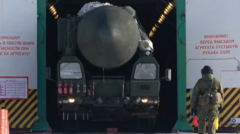On the day Russia officially launched its invasion of Ukraine in February 2022, Anton, a former officer in the Russian nuclear forces, recalls that the nuclear weapons base where he was stationed was put on full combat alert. "Before that, we had only exercises. But on the day the war started, the weapons were fully in place," he states, illustrating the immediate shift in military readiness.
Meeting Anton in an undisclosed location outside Russia, the BBC has taken extensive measures to protect his identity. Documents that confirm his rank and unit have been provided, offering some credibility to his claims, which align with Russian military directives at the outset of the conflict. Just days after the invasion, President Vladimir Putin announced a special combat status for Russia’s nuclear deterrence forces, a claim Anton asserts was already operational from the start.
During his time at the facility, he emphasizes that soldiers were closely monitored and trained specialists, devoid of conscripts. "Our reaction time was two minutes," he states proudly, explaining the high stakes involved in guarding such sensitive assets. His role was primarily to prevent unauthorized communication, emphasizing a culture of secrecy and tight control over personnel.
The intricacies of Russia's nuclear arsenal are further complicated by the country's military doctrine. Recent amendments to this doctrine officially permit the use of nuclear weapons under certain conditions, reflecting an expectation of heightened conflict. Western experts have raised concerns about the functionality of Russia’s older nuclear hardware, which the former officer refutes, arguing that the arsenal is continuously maintained and operational.
Yet, Anton's perspective is clouded by moral conflict. He describes receiving orders that crossed ethical boundaries, particularly an instruction to conduct indoctrination sessions labeling Ukrainian civilians as combatants. This prompted him to refuse compliance, a decision that led to harsher reassignments and threats of front-line deployment.
Ultimately, fearing for his life, Anton chose to desert and flee, facilitated by an organization supporting military deserters. With the influx of military personnel abandoning their posts, he notes a troubling trend of increased violence and pressure against those attempting to escape the regime.
Even in exile, Anton is wary of repercussions. He has ceased communications with fellow soldiers at the nuclear base to protect them from potential investigations, emphasizing the risks faced by those who oppose the war. "I understand the more I do that, the higher the chances they could try and kill me," he admits, reflecting the nature of dissent in a highly repressive military environment.
Through his testimony, Anton seeks to illuminate the fears and resistance that exist within the Russian military, asserting that many do not support the continued aggression in Ukraine, despite the regime’s narrative.




















